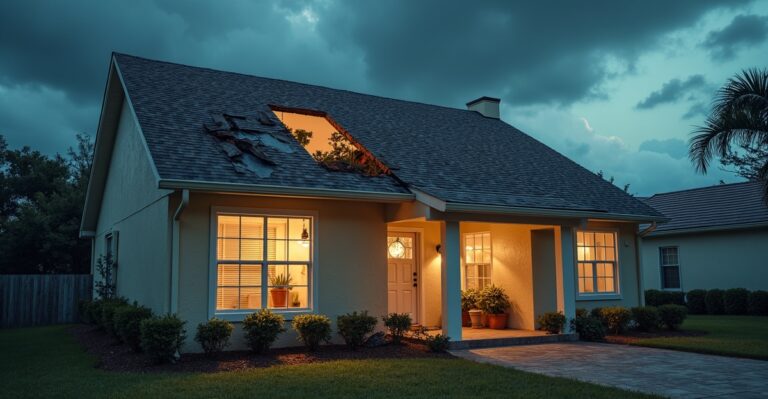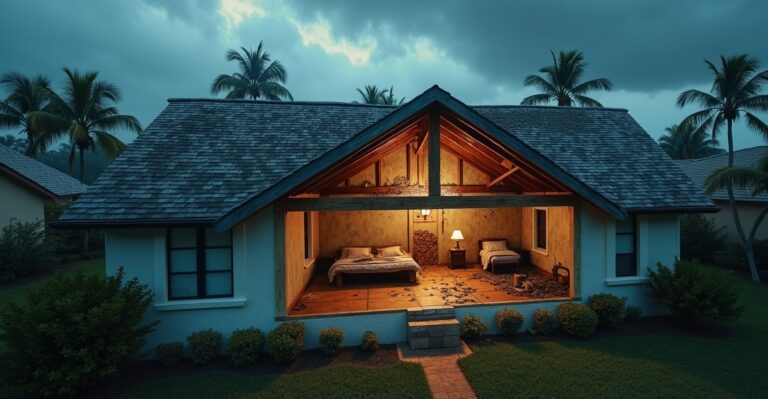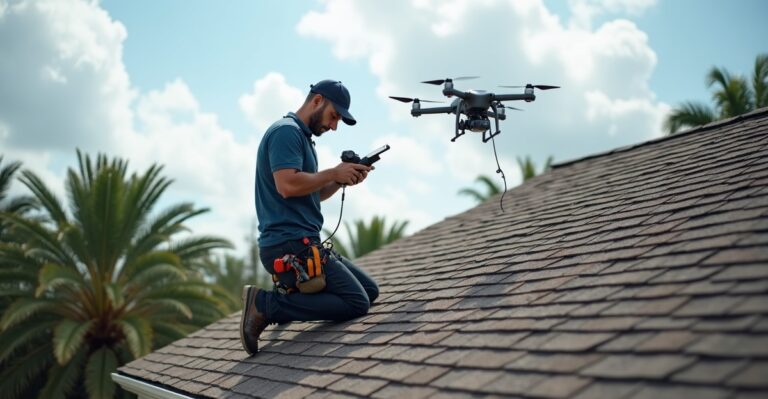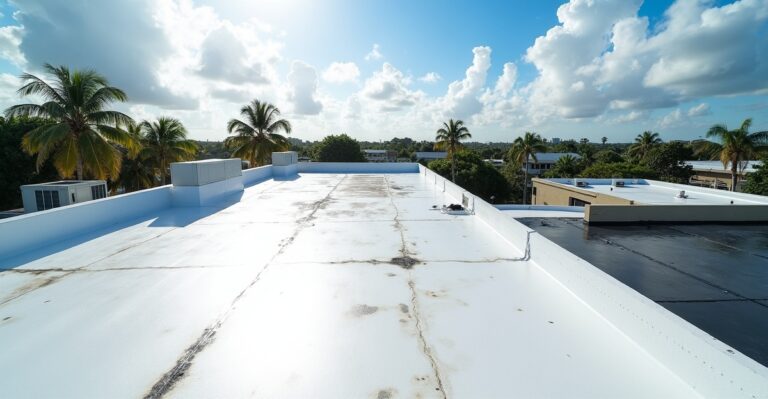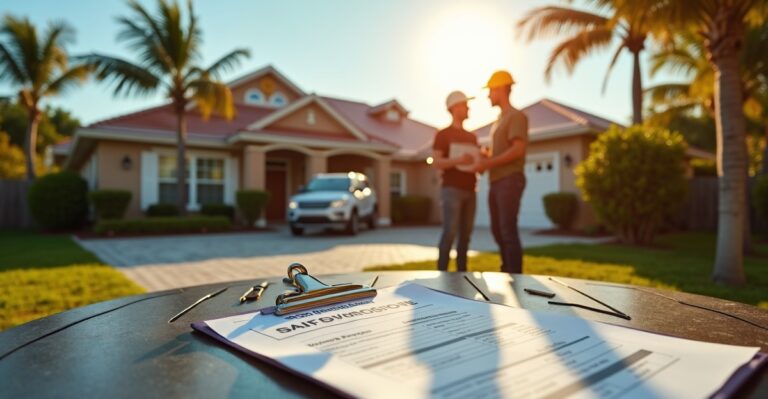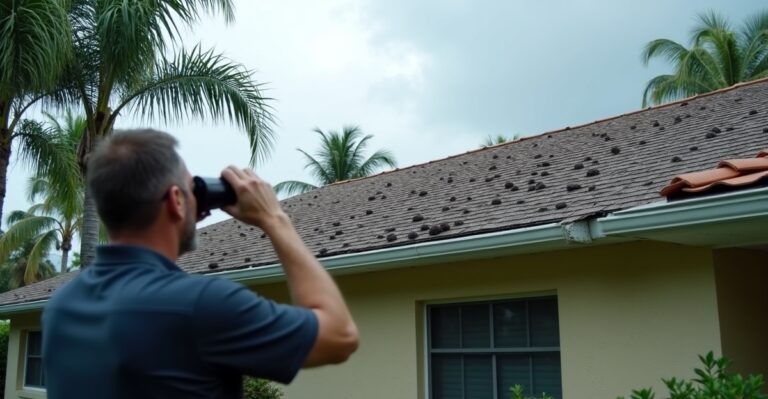How Much Does a Commercial Roof Coating Cost in Florida?
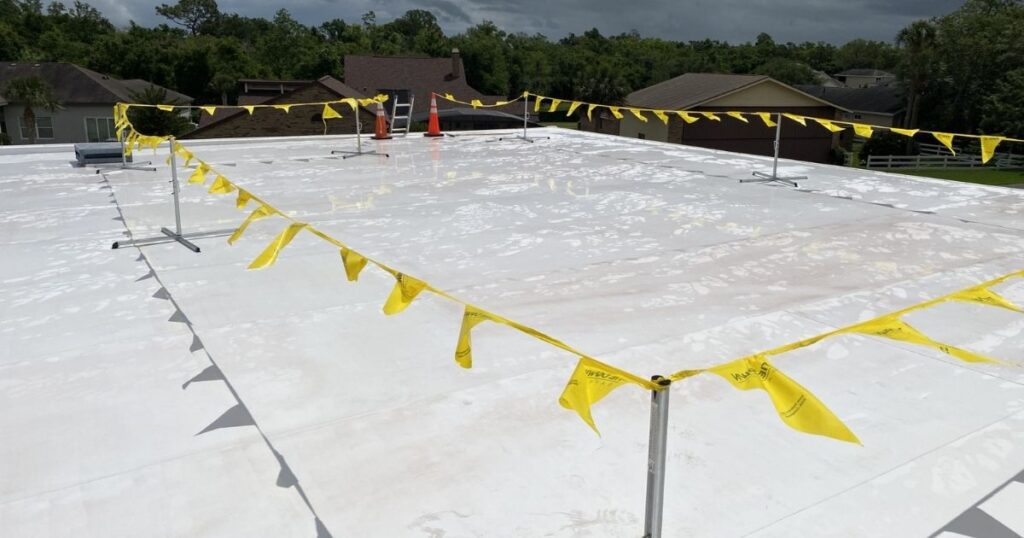
If you’re a property owner in Florida exploring ways to extend the life of your commercial roof, you’ve likely wondered about the true commercial roof coating cost in Florida. This guide breaks down everything you need to know—from average price ranges to the key factors that influence costs across different coating types and property sizes.
Whether you’re budgeting for a preventative upgrade or evaluating contractor proposals, this article will help you make a confident, informed decision that protects your investment and delivers long-term value.
Here’s what we’ll cover:
- What Is a Commercial Roof Coating and Why It Matters
- Average Commercial Roof Coating Costs in Florida
- What Affects the Cost of Commercial Roof Coatings
- Popular Coating Types and Their Pros & Cons
- Florida-Specific Factors That Influence Roof Coating Costs
- Why Choose Pyramid Roofing Fla for Your Commercial Roof Coating
- Conclusion
First, let’s understand what a commercial roof coating actually is—and why it’s worth considering for your property.
What Is a Commercial Roof Coating and Why It Matters
A commercial roof coating is a protective layer applied to the surface of an existing roof to extend its life, prevent leaks, and improve energy efficiency. Think of it like a high-performance seal or topcoat—similar to how you might apply a protective finish to a deck or driveway to preserve it against the elements. For flat or low-slope commercial roofs, this coating acts as a shield against Florida’s relentless sun, heavy rains, and humidity.
These coatings are typically made from materials like silicone, acrylic, or elastomeric compounds. Once applied, they cure into a seamless, waterproof membrane that restores the integrity of aging roof surfaces. Importantly, commercial roof coatings don’t require full roof tear-offs, making them a cost-effective alternative to roof replacement in many cases.
Understanding roof coatings—and what they’re designed to solve—is the first step in evaluating whether the commercial roof coating cost in Florida is worth the investment. From reducing energy bills to avoiding major structural repairs, the value often lies in long-term prevention and performance.
How Roof Coatings Protect and Extend Roof Life
When properly installed, a roof coating serves multiple functions, and the expected lifespan of roof coatings can extend up to two decades also consider roof coating maintenance cost over time with the right product and conditions.
- Prevents leaks by sealing cracks, seams, and other weak points.
- Reflects UV rays, reducing surface temperatures and interior cooling costs.
- Acts as a moisture barrier, offering waterproofing for flat roofs exposed to ponding water.
- Restores roof membrane performance, improving durability without replacing the underlying structure.
- Supports energy-efficient roofing solutions by reducing HVAC strain—especially valuable for commercial properties with large surface areas.
In Florida’s hot, humid, and storm-prone climate, these benefits are more than just bonuses—they’re often essential. Many commercial building owners use coatings as part of a preventative maintenance plan, delaying expensive replacements while still meeting performance and code requirements.
Key takeaway: Commercial roof coatings matter because they offer a practical, budget-conscious way to extend roof life, improve energy efficiency, and protect your property from Florida’s toughest weather—without the downtime or cost of full replacement.
Average Commercial Roof Coating Costs in Florida
When budgeting for a commercial roof coating in Florida, a top concern is roof coating contractors cost, which goes beyond just per‑square‑foot pricing? The answer depends on a few key factors, but you can expect most projects to fall within a general range. Understanding that range—and what influences it—can help you plan more effectively and avoid surprises down the line.
Florida’s unique climate, local labor rates, and material availability all influence roof recoating cost on commercial properties. High UV exposure, frequent storms, and humidity place greater demand on roofing materials, which means premium coatings (like silicone or elastomeric) are often recommended. Additionally, labor costs can vary slightly between regions like Palm Coast, Daytona Beach, and Jacksonville based on project size, accessibility, and contractor availability.
Typical Roof Coating Contractors Prices Per Square Foot
If you’re wondering how much should I pay for roof coating, here’s a look at flat roof coating cost ranges for commercial roof coatings across in Central and Northeast Florida:
- Acrylic Coating: $2.50 – $4.00 per sq. ft.
- Silicone Coating: $3.50 – $6.00 per sq. ft.
- Elastomeric Coating: $3.00 – $5.50 per sq. ft.
- Premium Systems (Gaco, multi-layer): $5.50 – $7.00+ per sq. ft.
These figures generally include surface preparation and materials, but you should also account for labor cost for roof coating—but not major structural fixes or solar panel removal.
Keep in mind: Costs can increase based on roof size, slope, substrate condition, and whether a warranty is included.
Real-World Cost Examples in Florida Markets
To give you a clearer picture, here are a few sample scenarios from actual Florida projects:
Small Office Building in Palm Coast (4,500 sq. ft.)
- Acrylic coating system
- Moderate prep work required
- Estimated cost: ~$13,500 ($3.00/sq. ft.)
Warehouse in Daytona Beach (20,000 sq. ft.)
- Silicone coating with extended warranty
- Some ponding areas and seam reinforcement needed
- Estimated cost: ~$95,000 ($4.75/sq. ft.)
Retail Plaza in Jacksonville (12,000 sq. ft.)
- Elastomeric coating over aging TPO membrane
- Roof membrane restoration and detail flashing included
- Estimated cost: ~$60,000 ($5.00/sq. ft.)
Each project is different, which is why requesting a roof coating estimate from a trusted local contractor is essential. Variables like existing roof condition, building accessibility, and warranty coverage can all shift the final price.
Key takeaway: In Florida, commercial roof coating costs typically range from $3 to $7 per square foot, depending on the material, prep work, and size of the roof. Always request a detailed, location-specific quote to make sure you’re comparing apples to apples.
What Affects the Cost of Commercial Roof Coatings
No two commercial roof coating projects are exactly alike—and the price you pay will depend on a combination of factors unique to your property. From the size of your building to the condition of the existing roof surface, several variables can influence your final quote. Here’s a breakdown of the most important elements that affect commercial roof coating cost in Florida.
Size and Accessibility of the Roof
It probably goes without saying, but larger roofs cost more to coat—both in materials and labor. However, cost per square foot often decreases as the project size increases due to economies of scale.
Accessibility is another big factor. Flat roofs that are easy to reach and free of obstructions are simpler (and cheaper) to coat. In contrast, roofs with lots of HVAC units, skylights, or difficult access points require more prep time, staging, and labor.
Material Type: Silicone vs. Acrylic vs. Elastomeric
The type of coating you choose is one of the biggest pricing drivers:
- Silicone Coatings offer top-tier waterproofing and excellent UV resistance, making them ideal for Florida’s wet and sunny climate. They’re often the most expensive option, but they last longer and require less maintenance.
- Acrylic Coatings are budget-friendly and highly reflective, helping reduce indoor temperatures. However, they’re less effective in areas prone to ponding water and may require more frequent reapplication.
- Elastomeric Coatings provide flexibility and durability, helping your roof adapt to Florida’s daily temperature swings. These coatings strike a balance between performance and price.
Choosing the right system isn’t just about cost—it’s about matching performance to your building’s needs. For example, a silicone coating might be a smart investment for a flat-roofed warehouse exposed to standing water and direct sunlight year-round.
Existing Roof Condition and Prep Work
Before any coating can be applied, the roof surface must be clean, dry, and structurally sound. If your roof is in good condition, prep work might be minimal—just a pressure wash and minor sealing.
However, older roofs with surface damage may add roof coating repair costs if old layers need stripping before recoating. This could include:
- Patching seams and blisters
- Removing debris or old coatings
- Replacing saturated insulation
- Repairing or resealing flashing and drains
This is where roof membrane restoration and low-slope roof maintenance come into play—more prep means more labor, which increases overall cost.
Warranties and Contractor Expertise
Working with a certified contractor can influence price—but in a good way. A company like Pyramid Roofing Fla, which is a Certified Gaco Contractor, offers warranty-backed systems that meet or exceed Florida’s commercial roofing regulations.
Warranties vary by product and contractor, but longer warranties often require more thorough prep, higher-end materials, and a manufacturer-approved installer.
Choosing a warranty-backed system ensures your investment is protected and may help with insurance claims or resale value.
Key takeaway: Commercial roof coating pricing isn’t one-size-fits-all. Factors like roof size, accessibility, coating material, prep work, and warranty coverage all play a role. To get the most value, it’s important to balance budget with long-term performance and reliability.
Popular Coating Types and Their Pros & Cons
Choosing the right roof coating isn’t just about cost—it’s about finding the best fit for your building’s needs, Florida’s climate, and your long-term goals. The most commonly used commercial roof coatings—silicone, acrylic, and elastomeric—each offer unique benefits and trade-offs in terms of durability, weather resistance, and energy efficiency.
Here’s a closer look at each type to help you make an informed decision.
Silicone Coatings
Silicone is widely considered the premium choice for commercial roof coatings in Florida, especially for flat roofs exposed to heavy rainfall or ponding water.
Pros:
- Superior waterproofing and leak resistance
- Highly reflective and UV-resistant, reducing surface heat
- Long-lasting with minimal maintenance
- Performs well in high-humidity climates
Cons:
- Higher cost per square foot
- Can be slippery when wet
- May attract dirt over time, affecting reflectivity
Best for: Properties where waterproofing and long-term durability are top priorities—like warehouses, industrial facilities, or buildings with minimal slope.
Acrylic Coatings
Acrylic coatings offer strong reflectivity and good performance at a lower cost, making them a popular choice for budget-conscious building owners.
Pros:
- Excellent solar reflectivity (great for energy savings)
- Easy to apply and environmentally friendly
- Lower material cost
- Compatible with a wide range of roof types
Cons:
- Less effective against ponding water
- Shorter lifespan in high-moisture environments
- May require more frequent reapplication in Florida’s wet seasons
Best for: Buildings with good drainage and owners seeking a cost-effective, energy-efficient solution.
Elastomeric Coatings
Elastomeric coatings are flexible and tough, able to expand and contract with the roof as temperatures rise and fall—perfect for Florida’s daily weather swings.
Pros:
- Strong adhesion and flexibility
- Good resistance to UV and thermal cycling
- Seals small cracks and seams well
- Mid-range price point
Cons:
- Durability varies based on brand and formulation
- May require additional surface prep for proper adhesion
Best for: Older roofs with minor surface wear or properties exposed to frequent temperature shifts.
Coating Comparison Table
| Coating Type | Best For | Avg. Cost (Per Sq. Ft.) | Key Strengths | Considerations |
| Silicone | Waterproofing, UV exposure | $3.50 – $6.00 | Waterproof, UV-resistant, low maintenance | Higher cost, dirt retention |
| Acrylic | Energy efficiency, affordability | $2.50 – $4.00 | Reflective, cost-effective, easy to apply | Poor ponding resistance |
| Elastomeric | Flexibility, aging roof surfaces | $3.00 – $5.50 | Expands/contracts, seals cracks | Varies in quality, prep-sensitive |
Key takeaway: There’s no one-size-fits-all solution. Silicone is ideal for waterproofing, acrylic shines in energy efficiency, and elastomeric offers flexibility for aging roofs. Consider your building’s needs, climate exposure, and budget when choosing the best coating type—and always work with a qualified contractor to ensure proper installation.
Florida-Specific Factors That Influence Roof Coating Costs
Florida’s unique environment plays a major role in how commercial roof coatings are selected, applied, and priced. The intense sun, heavy humidity, and frequent storms place higher demands on roofing systems than in many other states. For Florida property owners, choosing the right coating isn’t just about longevity—it’s about local performance, protection, and compliance.
Here are three Florida-specific considerations that can significantly impact the commercial roof coating cost in Florida:
Sun, Heat, and Humidity
Florida’s year-round sunshine and sweltering summers make reflective roof coatings for hot climates more than just a luxury—they’re a smart energy-saving solution. Coatings with high solar reflectivity, especially white or light-colored silicone and acrylic options, help deflect UV rays and lower roof surface temperatures.
This not only improves indoor comfort but can also reduce cooling costs significantly for commercial buildings with large, flat roofs. In fact, studies show that cool roofs with high solar reflectance can reduce peak cooling demand by 11–27% in air-conditioned buildings. In many cases, businesses see a return on investment through decreased energy bills—particularly in air conditioning-heavy seasons.
Tip: Ask your contractor about ENERGY STAR®-rated coatings to maximize energy efficiency benefits.
Hurricane and Storm Preparedness
Florida’s hurricane season brings powerful winds, driving rain, and flying debris—so durability and waterproofing matter. Silicone and elastomeric coatings are often preferred for their seamless application and ability to resist water intrusion, even during prolonged storm events.
Strong adhesion is crucial. A properly installed roof coating can help prevent uplift, seal vulnerable seams, and add an extra layer of defense against leaks when storms hit. While storm-readiness may raise the upfront cost slightly, it can save thousands in post-storm repairs or insurance claims.
Fact: Some commercial insurers may offer incentives or reduced premiums for businesses that invest in storm-resistant roofing systems.
Local Building Code and Regulation Requirements
Florida has some of the strictest roofing codes in the country—especially in coastal and high-wind zones. Commercial roof coatings must often meet Florida commercial roofing regulations and be classified as building code compliant roof solutions to be approved for certain properties or warranties.
Code compliance may affect your contractor’s choice of materials, application methods, and documentation. It can also impact pricing, especially if permits or manufacturer certifications are required.
Important: Always choose a licensed Florida roofing contractor who understands local codes to avoid delays or costly rework.
Key takeaway: In Florida, heat, storms, and regulation aren’t just background conditions—they directly impact how roof coatings are selected, applied, and priced. Choosing the right system means accounting for reflectivity, waterproofing, and code compliance—three essentials for long-term performance in the Sunshine State.
Why Choose Pyramid Roofing Fla for Your Commercial Roof Coating
When it comes to protecting your commercial property, choosing the right roofing contractor is just as important as selecting the right coating material. At Pyramid Roofing Fla, we combine proven experience with trusted local service to deliver long-lasting, code-compliant roof coating solutions—tailored specifically for Florida’s climate and building needs.
Certified Gaco Contractor with 30+ Years Experience
Our owner brings over three decades of hands-on roofing expertise to every project, and Pyramid Roofing Fla is proud to be a Certified Gaco Contractor—a designation that speaks to our commitment to quality and high-performance coating systems. Gaco products are recognized for their durability, energy efficiency, and superior waterproofing, making them ideal for commercial properties across Florida.
This certification means your roof coating will be applied to manufacturer standards and backed by optional warranty protection, ensuring your investment is secure for the long haul.
Trusted by Local Florida Businesses
From retail centers in Palm Coast to warehouses in Daytona Beach and office buildings in Jacksonville, we’ve earned the trust of business owners and property managers throughout Central and Northeast Florida. Our clients choose us for our honesty, responsiveness, and track record of doing the job right—on time and with minimal disruption to daily operations.
We understand Florida building codes, weather patterns, and permitting processes, which allows us to deliver fast, compliant, and reliable service. That’s why our customers often return to us for ongoing maintenance and preventative roof care.
Request a Transparent, Warranty-Backed Estimate
If you’re considering a commercial roof coating, the next step is simple: request a roof coating quote from our experienced team. We’ll assess your roof, explain your options, and provide a clear breakdown of costs—no guesswork, no pressure.
With Pyramid Roofing Fla, you’re not just getting a quote—you’re getting a partner who stands behind every project with local pride and proven expertise.
Key takeaway: From certified coating systems to local knowledge and a reputation for reliability, Pyramid Roofing Fla is the go-to roofing partner for businesses that want lasting value and peace of mind.
Conclusion
Commercial roof coating costs in Florida can vary widely, but understanding the key factors—like roof size, material type, surface condition, and regional climate—can help you plan with confidence. Whether you’re considering a silicone system for superior waterproofing or an acrylic option for energy savings, the right coating can significantly extend your roof’s life while reducing long-term maintenance and utility costs.
Florida’s intense sun, frequent storms, and strict building codes demand more from your roofing system. That’s why working with a knowledgeable, locally trusted contractor like Pyramid Roofing Fla is essential. We specialize inroof coatings designed to meet Florida’s unique demands—offering durability, energy efficiency, and peace of mind, backed by real experience and warranty support.
If you’re ready to protect your property with a cost-effective, long-lasting solution, we’re here to help. Request a free, transparent estimate today and discover how a professional roof coating can deliver value far beyond the price per square foot.
Frequently Asked Questions
In Florida, commercial roof coatings typically range from $3 to $7 per square foot, depending on the coating type, roof condition, and project complexity. Silicone systems are on the higher end due to their superior waterproofing and durability, while acrylic coatings offer a more affordable option with strong reflectivity benefits.
Yes—especially in Florida’s challenging climate. A professionally applied roof coating can extend the life of your existing roof, reduce cooling costs, and protect against water intrusion during heavy rains or hurricanes. For many businesses, this preventative measure helps delay costly replacements and minimizes operational disruptions.
When properly installed, a commercial roof coating can last 10 to 20 years in Florida’s environment. Silicone coatings tend to last longer, even in extreme heat and humidity, while acrylic coatings may need reapplication sooner if exposed to ponding water or heavy UV exposure.
Silicone coatings are often the best choice for flat roofs in Florida due to their strong resistance to ponding water and UV rays. Elastomeric coatings are also well-suited for low-slope surfaces that experience daily temperature shifts. The best option depends on your roof’s condition, drainage, and performance needs.
It depends on your policy and the nature of the damage. In some cases, insurance may cover part or all of a roof coating project if it’s used to restore storm-damaged areas. It’s important to document the damage, work with a licensed contractor, and check with your insurance provider to understand what’s covered.

